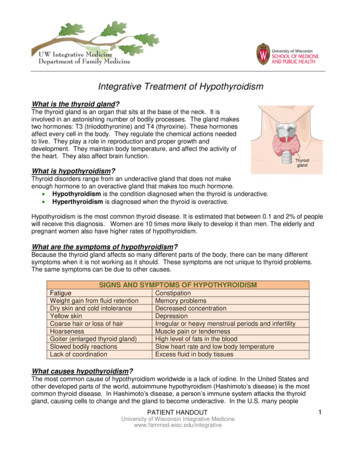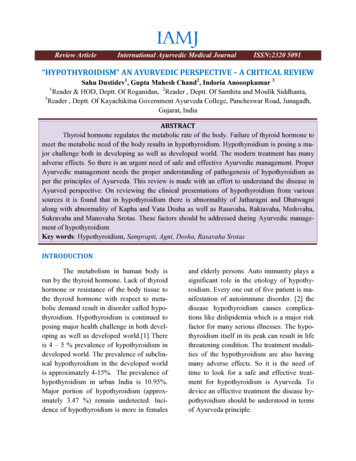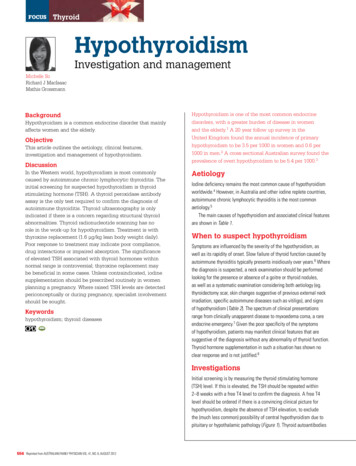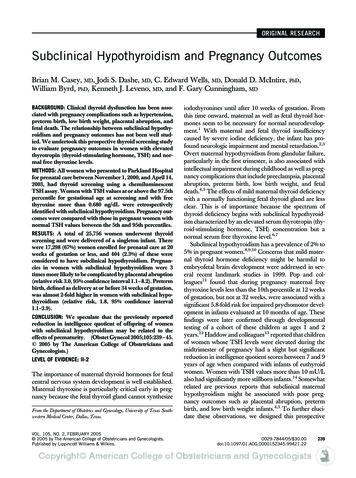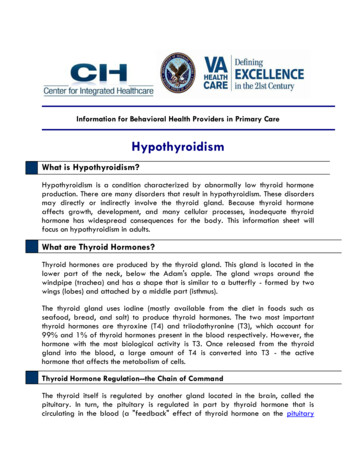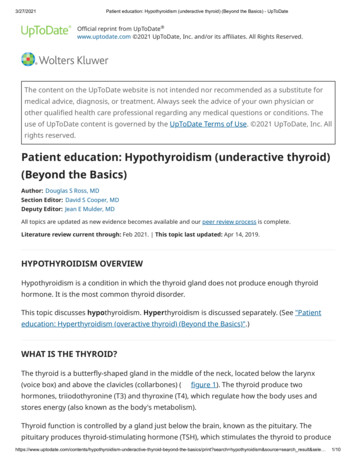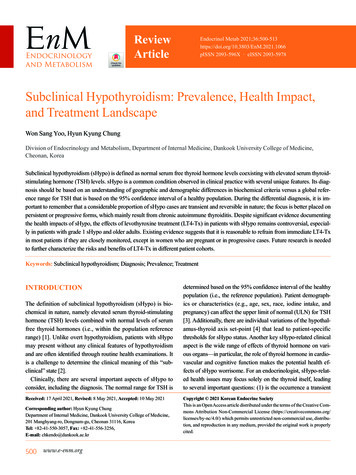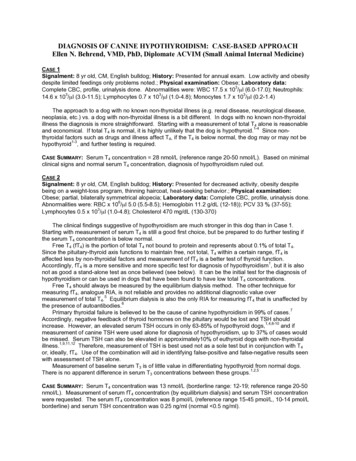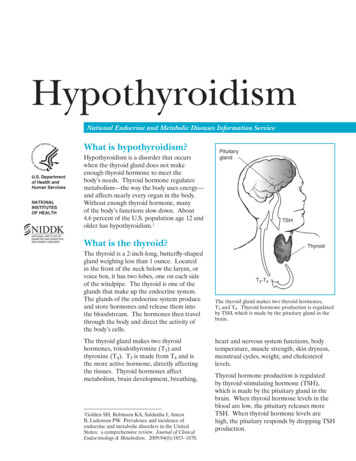
Transcription
HypothyroidismNational Endocrine and Metabolic Diseases Information ServiceWhat is hypothyroidism?U.S. Departmentof Health andHuman ServicesNATIONALINSTITUTESOF HEALTHHypothyroidism is a disorder that occurswhen the thyroid gland does not makeenough thyroid hormone to meet thebody’s needs. Thyroid hormone regulatesmetabolism—the way the body uses energy—and affects nearly every organ in the body.Without enough thyroid hormone, manyof the body’s functions slow down. About4.6 percent of the U.S. population age 12 andolder has hypothyroidism.1PituitaryglandTSHWhat is the thyroid?The thyroid is a 2-inch-long, butterfly-shapedgland weighing less than 1 ounce. Locatedin the front of the neck below the larynx, orvoice box, it has two lobes, one on each sideof the windpipe. The thyroid is one of theglands that make up the endocrine system.The glands of the endocrine system produceand store hormones and release them intothe bloodstream. The hormones then travelthrough the body and direct the activity ofthe body’s cells.The thyroid gland makes two thyroidhormones, triiodothyronine (T3) andthyroxine (T4). T3 is made from T4 and isthe more active hormone, directly affectingthe tissues. Thyroid hormones affectmetabolism, brain development, breathing,1Golden SH, Robinson KA, Saldanha I, AntonB, Ladenson PW. Prevalence and incidence ofendocrine and metabolic disorders in the UnitedStates: a comprehensive review. Journal of ClinicalEndocrinology & Metabolism. 2009;94(6):1853–1878.ThyroidT3-T4The thyroid gland makes two thyroid hormones,T3 and T4. Thyroid hormone production is regulatedby TSH, which is made by the pituitary gland in thebrain.heart and nervous system functions, bodytemperature, muscle strength, skin dryness,menstrual cycles, weight, and cholesterollevels.Thyroid hormone production is regulatedby thyroid-stimulating hormone (TSH),which is made by the pituitary gland in thebrain. When thyroid hormone levels in theblood are low, the pituitary releases moreTSH. When thyroid hormone levels arehigh, the pituitary responds by dropping TSHproduction.
What causeshypothyroidism?Hypothyroidism has several causes, including Hashimoto’s disease thyroiditis, or inflammation of thethyroid congenital hypothyroidism, orhypothyroidism that is present at birth surgical removal of part or all of thethyroid radiation treatment of the thyroid some medicationsLess commonly, hypothyroidism is caused bytoo much or too little iodine in the diet or byabnormalities of the pituitary gland.Hashimoto’s DiseaseHashimoto’s disease, also called chroniclymphocytic thyroiditis, is the most commoncause of hypothyroidism in the UnitedStates.1 Hashimoto’s disease is a form ofchronic inflammation of the thyroid gland.Hashimoto’s disease is also an autoimmunedisorder.Normally, the immune system protectsthe body against foreign invaders—suchas viruses and bacteria—that can causeillness. But in autoimmune diseases, theimmune system attacks the body’s own cellsand organs. With Hashimoto’s disease, theimmune system attacks the thyroid, causinginflammation and interfering with its abilityto produce thyroid hormones.More information about Hashimoto’s diseasecan be found in the National Endocrine andMetabolic Diseases Information Service(NEMDIS) fact sheet Hashimoto’s Disease atwww.endocrine.niddk.nih.gov.2 HypothyroidismThyroiditisThyroiditis causes stored thyroid hormoneto leak out of the thyroid gland. At first,the leakage raises hormone levels in theblood, leading to hyperthyroidism—whenthyroid hormone levels are too high––thatlasts for 1 to 2 months. Most people thendevelop hypothyroidism before the thyroid iscompletely healed.Several types of thyroiditis can causehyperthyroidism followed by hypothyroidism: Subacute thyroiditis. This conditioninvolves painful inflammation andenlargement of the thyroid. Expertsare not sure what causes subacutethyroiditis, but it may be related toa viral or bacterial infection. Thecondition usually goes away on its ownin a few months. Postpartum thyroiditis. This type ofthyroiditis develops after a womangives birth. For more information, seethe section titled “What happens withpregnancy and thyroid conditions?” Silent thyroiditis. This type ofthyroiditis is called “silent” becauseit is painless, as is postpartumthyroiditis, even though the thyroidmay be enlarged. Like postpartumthyroiditis, silent thyroiditis is probablyan autoimmune condition andsometimes develops into permanenthypothyroidism.Congenital HypothyroidismSome babies are born with a thyroidthat is not fully developed or does notfunction properly. If untreated, congenitalhypothyroidism can lead to mentalretardation and growth failure. Earlytreatment can prevent these complications,so most newborns in the United States arescreened for hypothyroidism.
Surgical Removal of the ThyroidWhen part of the thyroid is removed, theremaining part may produce normal amountsof thyroid hormone, but some people whohave this surgery develop hypothyroidism.Removal of the entire thyroid always resultsin hypothyroidism.Part or all of the thyroid may be surgicallyremoved as a treatment forWhat are the symptoms ofhypothyroidism?Hypothyroidism has many symptoms that canvary from person to person. Some commonsymptoms of hypothyroidism are fatigue weight gain a puffy face hyperthyroidism cold intolerance a large goiter, which is an enlargedthyroid that may cause the neck toappear swollen and can interfere withnormal breathing and swallowing joint and muscle pain thyroid nodules, which arenoncancerous tumors, called adenomas,or lumps in the thyroid that can produceexcess thyroid hormone dry, thinning hair thyroid cancerRadiation Treatment of theThyroidRadioactive iodine, a common treatmentfor hyperthyroidism, gradually destroysthe cells of the thyroid. Most peoplewho receive radioactive iodine treatmenteventually develop hypothyroidism. Peoplewith Hodgkin’s disease, other lymphomas,and head or neck cancers are treated withradiation, which can also damage the thyroid.MedicationsSome drugs can interfere with thyroidhormone production and lead tohypothyroidism, including amiodarone, a heart medication interferon alpha, a cancer medication lithium, a bipolar disorder medication interleukin-2, a kidney cancermedication3 Hypothyroidism constipation dry skin decreased sweating heavy or irregular menstrual periodsand impaired fertility depression slowed heart rateHowever, hypothyroidism develops slowly,so many people don’t notice symptoms of thedisease.Symptoms more specific to Hashimoto’sdisease are a goiter and a feeling of fullnessin the throat.Hypothyroidism can contribute to highcholesterol, so people with high cholesterolshould be tested for hypothyroidism. Rarely,severe, untreated hypothyroidism may leadto myxedema coma, an extreme form ofhypothyroidism in which the body’s functionsslow to the point that it becomes lifethreatening. Myxedema requires immediatemedical treatment.
Who is likely to develophypothyroidism?Women are much more likely than men todevelop hypothyroidism. The disease is alsomore common among people older thanage 60.1Certain factors can increase the chances ofdeveloping thyroid disorders. People mayneed more regular testing if they have had a thyroid problem before, suchas a goiter have had surgery to correct a thyroidproblem have received radiation to the thyroid,neck, or chest have a family history of thyroid disease have other autoimmune diseases,including– Sjögren’s syndrome, characterized bydry eyes and mouth– pernicious anemia, a vitamin B12deficiency– type 1 diabetes– rheumatoid arthritis– lupus, a chronic inflammatorycondition have Turner syndrome, a geneticdisorder that affects females are older than age 60 have been pregnant or delivered a babywithin the past 6 monthsPeople should get tested regularly to helpuncover thyroid problems—especiallysubclinical problems. Subclinical means aperson has no apparent symptoms.What happens withpregnancy and thyroidconditions?Hypothyroidism. During pregnancy,hypothyroidism is usually caused byHashimoto’s disease and occurs in three tofive out of every 1,000 pregnancies.2Uncontrolled hypothyroidism raises thechance of miscarriage, preterm delivery, andpreeclampsia—a dangerous rise in bloodpressure during late pregnancy.Untreated hypothyroidism during pregnancymay also affect the baby’s growth andbrain development. Thyroid medicationscan help prevent these problems and aresafe to take during pregnancy. Womenwith hypothyroidism should discuss theircondition with their health care providerbefore becoming pregnant.Postpartum thyroiditis. This inflammationof the thyroid gland affects about 4 to9 percent of women in the first year aftergiving birth.2 Postpartum thyroiditis isbelieved to be an autoimmune condition andcauses hyperthyroidism that usually lasts for1 to 2 months.Women with postpartum thyroiditis oftendevelop hypothyroidism before the thyroidgland is completely healed. The condition islikely to recur with future pregnancies.Postpartum thyroiditis sometimes goesundiagnosed because the symptoms aremistaken for postpartum blues—theexhaustion and moodiness that sometimesfollow delivery. If symptoms of fatigue2Ogunyemi DA. Autoimmune thyroid disease andpregnancy. emedicine website. iew. UpdatedMarch 8, 2012. Accessed February 11, 2013.4 Hypothyroidism
and lethargy do not go away within a fewmonths or if a woman develops postpartumdepression, she should talk with her healthcare provider. If the hypothyroidismsymptoms are bothersome, thyroidmedication can be given.More information can be found in theNEMDIS fact sheet Pregnancy and ThyroidDisease at www.endocrine.niddk.nih.gov.How is hypothyroidismdiagnosed?Many symptoms of hypothyroidism arethe same as those of other diseases, sohypothyroidism usually cannot be diagnosedbased on symptoms alone. With suspectedhypothyroidism, health care providers takea medical history and perform a thoroughphysical examination. Health care providersmay then use several blood tests to confirma diagnosis of hypothyroidism and find itscause:TSH test. The ultrasensitive TSH test isusually the first test a health care providerperforms. This test detects even tinyamounts of TSH in the blood and is themost accurate measure of thyroid activityavailable. Generally, a TSH reading abovenormal means a person has hypothyroidismand a reading below normal means a personhas hyperthyroidism.Mildly elevated TSH without symptomsindicates subclinical hypothyroidism. Somehealth care providers treat subclinicalhypothyroidism immediately. Othersprefer to leave it untreated but monitortheir patients for signs that the condition isworsening.Health care providers may conductadditional tests to help confirm the diagnosisor determine the cause of hypothyroidism.5 HypothyroidismT4 test. This test measures the actualamount of circulating thyroid hormone in theblood. In hypothyroidism, the level of T4 inthe blood is lower than normal.Thyroid autoantibody test. This test looksfor the presence of thyroid autoantibodies.Most people with Hashimoto’s diseasehave these antibodies, but people whosehypothyroidism is caused by other conditionsdo not.More information about testing for thyroidproblems can be found in the NEMDISfact sheet Thyroid Function Tests atwww.endocrine.niddk.nih.gov.How is hypothyroidismtreated?Health care providers treat hypothyroidismwith synthetic thyroxine, a medication thatis identical to the hormone T4. The exactdose will depend on the patient’s age andweight, the severity of the hypothyroidism,the presence of other health problems, andwhether the person is taking other drugs thatmight interfere with how well the body usesthyroid hormone.Health care providers test TSH levels about6 to 8 weeks after a patient begins takingthyroid hormone and make any necessaryadjustments to the dose. Each time the doseis adjusted, the blood is tested again. Oncea stable dose is reached, blood tests arenormally repeated in 6 months and then oncea year.Hypothyroidism can almost always becompletely controlled with syntheticthyroxine, as long as the recommended doseis taken every day as instructed.
Eating, Diet, and NutritionExperts recommend that people eat abalanced diet to obtain most nutrients. Moreinformation about diet and nutrition can befound on the National Agricultural Librarywebsite at www.nutrition.gov.Dietary SupplementsIodine is an essential mineral for the thyroid.However, people with autoimmune thyroiddisease may be sensitive to harmful sideeffects from iodine. Taking iodine dropsor eating foods containing large amountsof iodine—such as seaweed, dulse, orkelp—may cause or worsen hypothyroidismor hyperthyroidism. More informationabout iodine can be found in the NationalLibrary of Medicine fact sheet Iodine indiet, available at 2421.htm.Women need more iodine when they arepregnant—about 250 micrograms a day—because the baby gets iodine from themother’s diet. In the United States, about7 percent of pregnant women may notget enough iodine in their diet or throughprenatal vitamins.3 Choosing iodized salt—salt supplemented with iodine—over plainsalt and prenatal vitamins containing iodinewill ensure this need is met.To help ensure coordinated and safe care,people should discuss their use of dietarysupplements, such as iodine, with their healthcare provider. Tips for talking with healthcare providers can be found on the NationalCenter for Complementary and AlternativeMedicine’s Time to Talk campaign website atwww.nccam.nih.gov/timetotalk.3Zimmerman MB. Iodine deficiency in pregnancyand the effects of maternal iodine supplementation onthe offspring: a review. American Journal of ClinicalNutrition. 2009;89(2):668S–672S.6 HypothyroidismPoints to Remember Hypothyroidism is a disorder thatoccurs when the thyroid gland doesnot make enough thyroid hormoneto meet the body’s needs. Thyroidhormone regulates metabolism.Without enough thyroid hormone,many of the body’s functions slowdown. Hypothyroidism has several causes,including––––Hashimoto’s diseasethyroiditiscongenital hypothyroidismsurgical removal of part or all ofthe thyroid– radiation treatment of thethyroid– some medications Hypothyroidism has manysymptoms that can vary fromperson to person. Some commonsymptoms of hypothyroidismare fatigue, weight gain, coldintolerance, constipation, impairedfertility, and depression. Women are much more likely thanmen to develop hypothyroidism. Women with hypothyroidismshould discuss their condition withtheir health care provider beforebecoming pregnant. Hypothyroidism can almost alwaysbe completely controlled withsynthetic thyroxine, as long as therecommended dose is taken everyday as instructed.
Hope through ResearchFor More InformationThe National Institute of Diabetes andDigestive and Kidney Diseases (NIDDK)conducts and supports research intomany kinds of disorders, includinghypothyroidism. Researchers throughoutthe United States and the world are workingto better understand, prevent, and treatthis disease. Researchers are investigatingthe development, signs and symptoms,and genetics of thyroid function disordersto further understand thyroid diseases.Scientists continue to study treatmentoptions for hypothyroidism and other thyroiddisorders.American Academy of Otolaryngology—Head and Neck Surgery1650 Diagonal RoadAlexandria, VA 22314–2857Phone: 703–836–4444Internet: www.entnet.orgClinical trials are research studies involvingpeople. Clinical trials look at safe andeffective new ways to prevent, detect, ortreat disease. Researchers also use clinicaltrials to look at other aspects of care, suchas improving the quality of life for peoplewith chronic illnesses. To learn more aboutclinical trials, why they matter, and how toparticipate, visit the NIH Clinical ResearchTrials and You website at www.nih.gov/health/clinicaltrials. For information about currentstudies, visit www.ClinicalTrials.gov.American Association of ClinicalEndocrinologists245 Riverside Avenue, Suite 200Jacksonville, FL 32202Phone: 904–353–7878Fax: 904–353–8185Internet: www.aace.comAmerican Thyroid Association6066 Leesburg Pike, Suite 550Falls Church, VA 22041Phone: 1–800–THYROID (1–800–849–7643)or 703–998–8890Fax: 703–998–8893Email: thyroid@thyroid.orgInternet: www.thyroid.orgHormone Health Network8401 Connecticut Avenue, Suite 900Chevy Chase, MD 20815–5817Phone: 1–800–HORMONE(1–800–467–6663)Fax: 301–941–0259Email: hormone@endo-society.orgInternet: www.hormone.orgThe Endocrine Society8401 Connecticut Avenue, Suite 900Chevy Chase, MD 20815Phone: 1–888–363–6274 or 301–941–0200Fax: 301–941–0259Email: societyservices@endo-society.orgInternet: www.endo-society.org7 Hypothyroidism
AcknowledgmentsPublications produced by the NIDDK arecarefully reviewed by both NIDDK scientistsand outside experts. This publication wasoriginally reviewed by Leonard Wartofsky,M.D., M.A.C.P., Washington HospitalCenter, and Nabeel Babar, M.D., NIDDK.You may also find additional information about thistopic by visiting MedlinePlus at www.medlineplus.gov.This publication may contain information aboutmedications and, when taken as prescribed, theconditions they treat. When prepared, this publication included the most current information available.For updates or for questions about any medications,contact the U.S. Food and Drug Administration tollfree at 1–888–INFO–FDA (1–888–463–6332) or visitwww.fda.gov. Consult your health care provider formore information.National Endocrineand Metabolic DiseasesInformation Service6 Information WayBethesda, MD 20892–3569Phone: 1–888–828–0904TTY: 1–866–569–1162Fax: 703–738–4929Email: endoandmeta@info.niddk.nih.govInternet: www.endocrine.niddk.nih.govThe National Endocrine and MetabolicDiseases Information Service is aninformation dissemination service of theNational Institute of Diabetes and Digestiveand Kidney Diseases (NIDDK). TheNIDDK is part of the National Institutes ofHealth, which is part of the U.S. Departmentof Health and Human Services.The NIDDK conducts and supportsbiomedical research. As a public service, theNIDDK has established information servicesto increase knowledge and understandingabout health and disease among patients,health professionals, and the public.This publication is not copyrighted. The NIDDKencourages users of this publication to duplicate anddistribute as many copies as desired.This publication is available atwww.endocrine.niddk.nih.gov.U.S. DEPARTMENT OF HEALTHAND HUMAN SERVICESNational Institutes of HealthNIH.Turning Discovery Into Health NIH Publication No. 13–6180March 2013The NIDDK prints on recycled paper with bio-based ink.
hypothyroidism. Congenital Hypothyroidism . Some babies are born with a thyroid that is not fully developed or does not function properly. If untreated, congenital hypothyroidism can lead to mental retardation and growth failure. Early treatment can prevent these complications, so most newborns in the United States are screened for hypothyroidism.

